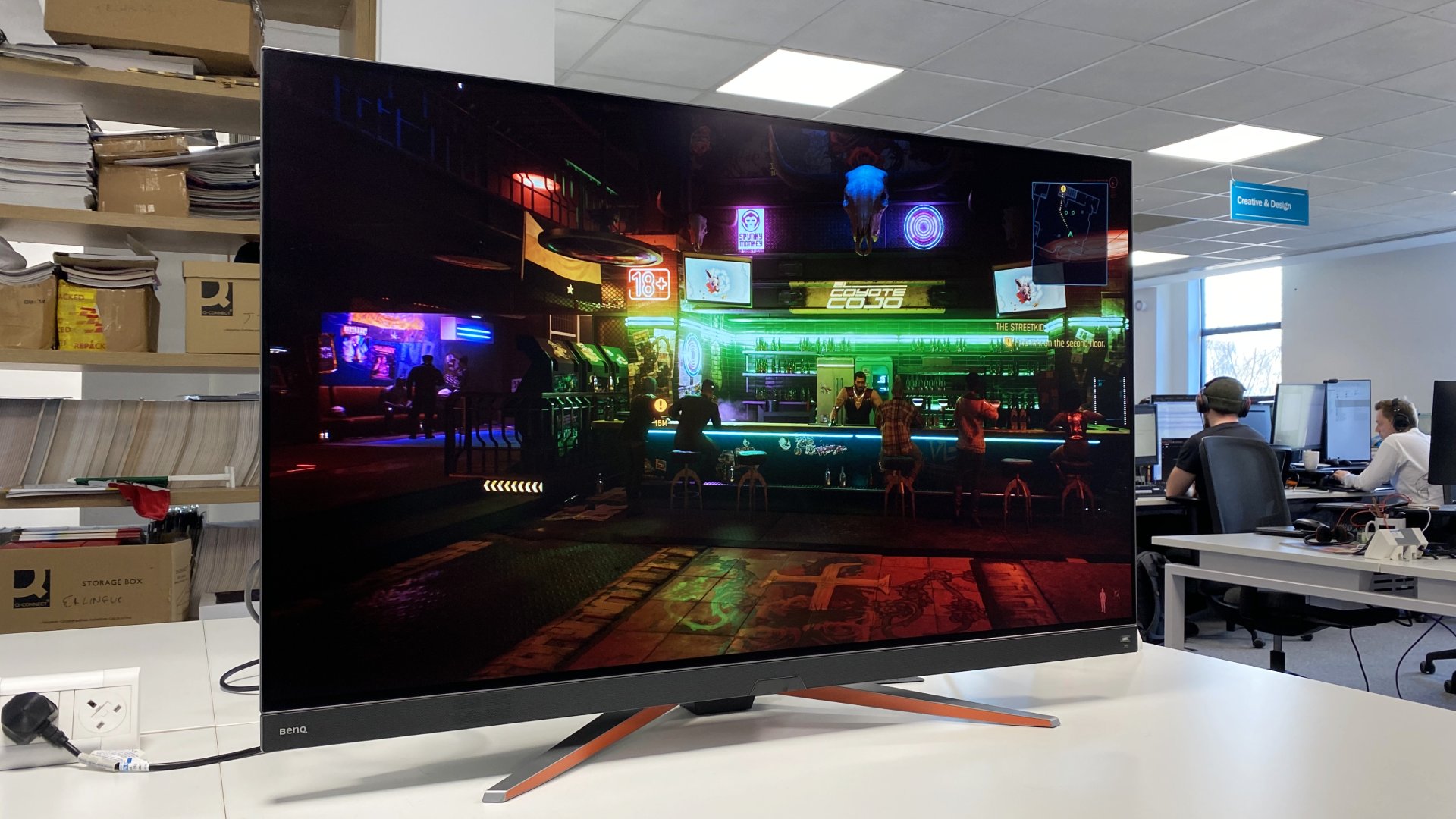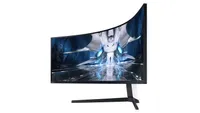TechRadar Verdict
OLED tech is rapidly becoming more familiar in the PC space and this BenQ beast doesn't deliver any surprises. On the upside, the LG OLED panel delivers characteristically fab contrast and pixel response. But the full-screen brightness is predictably poor.
Pros
- +
Huge 4K experience
- +
Fantastic contrast
- +
Excellent pixel response
Cons
- -
Very expensive
- -
Poor full-screen brightness
- -
Arguably too big to be a true monitor
Why you can trust TechRadar
BenQ Mobiuz EX480UZ: Two-minute review
OLED PC gaming panels are now arriving thick and fast, the latest example of which is the new BenQ Mobiuz EX480UZ, a 48-inch monster of a monitor. It's also fully 4K and good for 120Hz refresh. In a word, wow.
In fact, this thing is so big it pushes the very notion of what a PC monitor can be right to the limit. In a conventional desktop setting and at a viewing distance of a couple feet, it's surely too big at 48 inches, even if it does have a monitor-style stand with a degree of tilt adjustment. That said, there's no height adjustment, which limits your options in terms of placement and ergonomics.
Ultimately, it's unclear what the optimal usage model is for this class of monitor. It's hard to see someone sitting right in front of it like a conventional PC monitor - so it's hard to recommend it as one of the best gaming monitors. The question is why you'd go for it over one of the best OLED TVs with similar specs. Hold that thought.
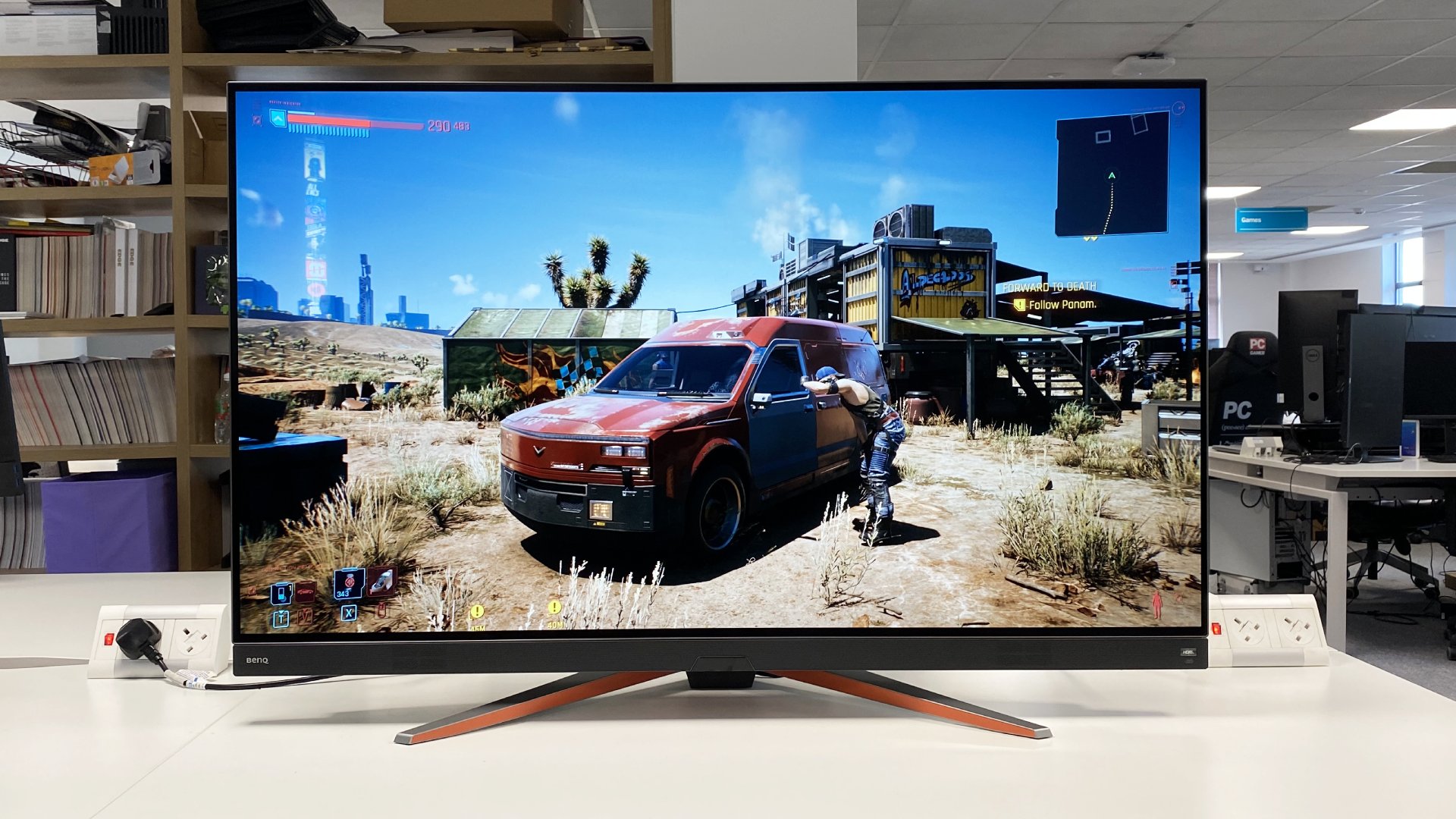
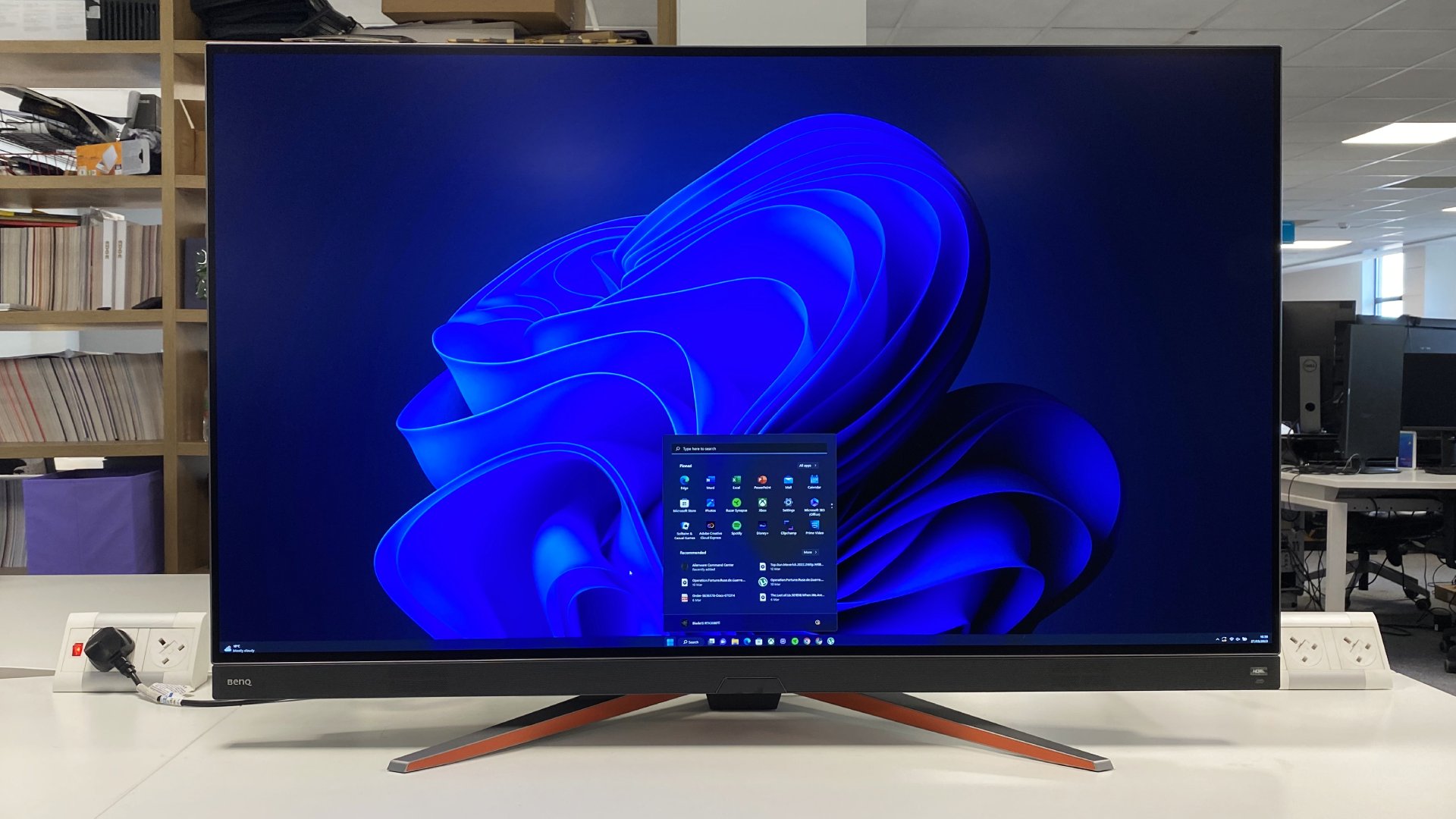
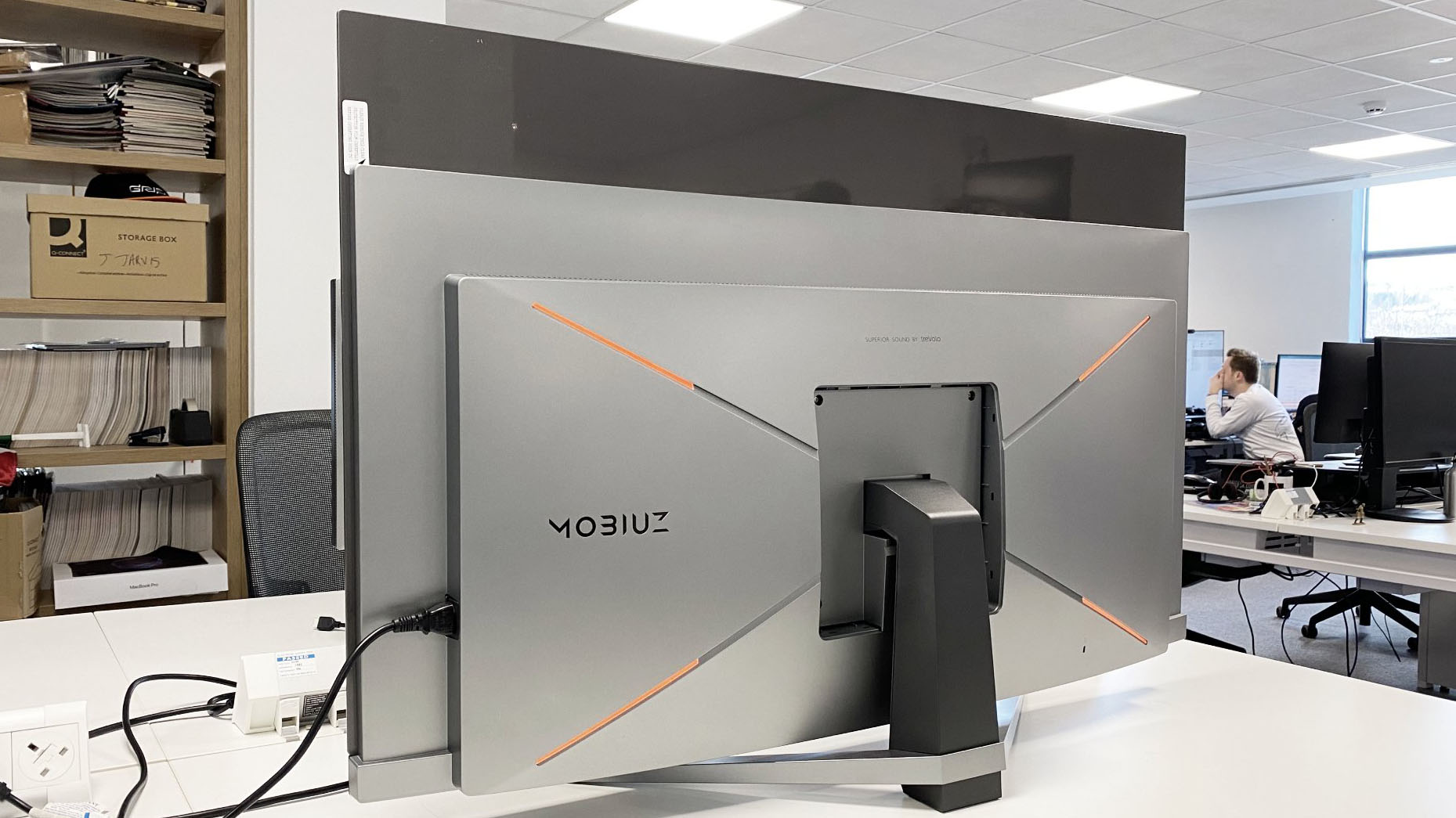
The BenQ Mobiuz EX480UZ also looks just like the rest of the Mobiuz gaming monitor range with its geometric design, plus silver and orange accents. The slim bezels on three sides of the panel, meanwhile, plus a relatively large chin are likewise standard BenQ Mobiuz design language. The overall vibe is game-y without being over the top or adolescent.
As for the broader technical details, the 48-inch OLED panel is sourced from LG and sports a full 4K pixel grid and thus a native resolution of 3,840 by 2,160. It's huge. BenQ claims a pretty modest peak brightness of 450 nits, though it doesn't specify the maximum window size at which that figure is attained. Full screen brightness is 135 nits, which is modest even by OLED standards.
That said, it's very speedy thanks to 0.1ms response, which is way faster than any LCD-based gaming monitor, plus 120Hz refresh. Yes, there are monitors with much higher maximum refresh rates. But 120Hz is arguably plenty for a 4K monitor. Even the latest and greatest graphics cards will struggle to hit 200 fps or more in modern games, after all.
Add in support for both AMD FreeSync and Nvidia G-Sync, and you have a recipe for very smooth gameplay. On paper, the BenQ Mobiuz EX480UZ looks good in terms of color fidelity and accuracy, too, thanks to 98% coverage of the DCI-P3 digital cinema gamut. Oh, and you also get BenQ's Trevolo audio solution including a 2.1 speaker system with a 10W subwoofer.
Sign up for breaking news, reviews, opinion, top tech deals, and more.
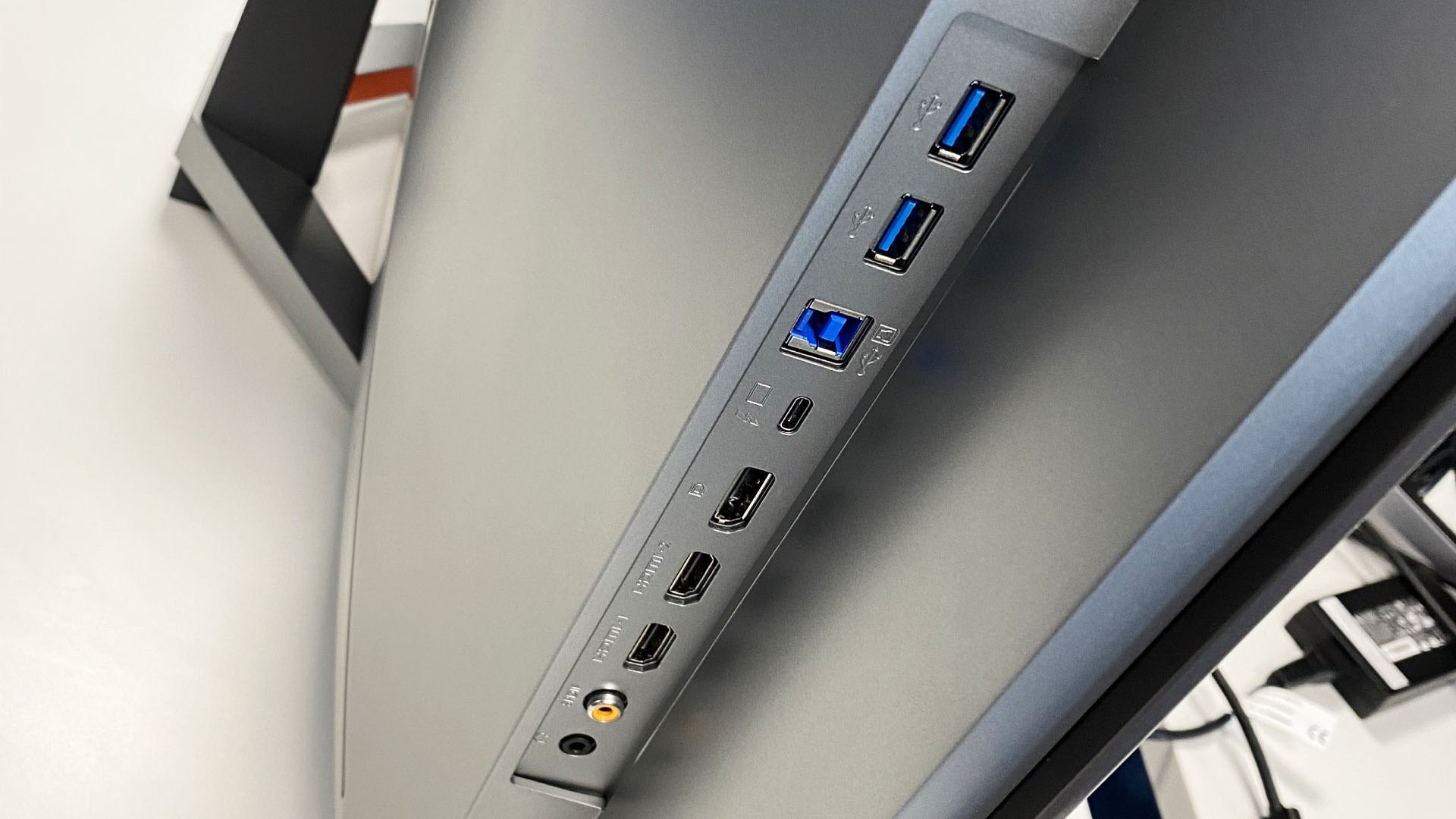
As for connectivity, that's where the BenQ Mobiuz EX480UZ really separates itself from an otherwise similar OLED TV. First, you get the obligatory pair of HDMI ports. Importantly, they're HDMI 2.1 spec and so support 120Hz refresh. That makes this a good candidate for sharing between a gaming PC and one of the latest 120Hz-capable consoles from Sony or Microsoft.
To that you can add the much more PC-centric DisplayPort 1.4 interface, which again supports the full 120Hz. What you absolutely won't see on an OLED TV, however, is the EX480UZ's USB-C connection complete with 90W of power delivery. So, you can drive this huge monitor with a laptop while keeping the laptop itself charged. Nice. Oh, and you also get an IR remote for accessing the OSD menu, which is handy on this large a monitor.
Anyway, if that's all the critical speeds and feeds covered off, how well does this monster monitor actually perform? The short answer is that it depends. At its best, it's pretty impressive. At its worst? You'll wonder where all the money went.
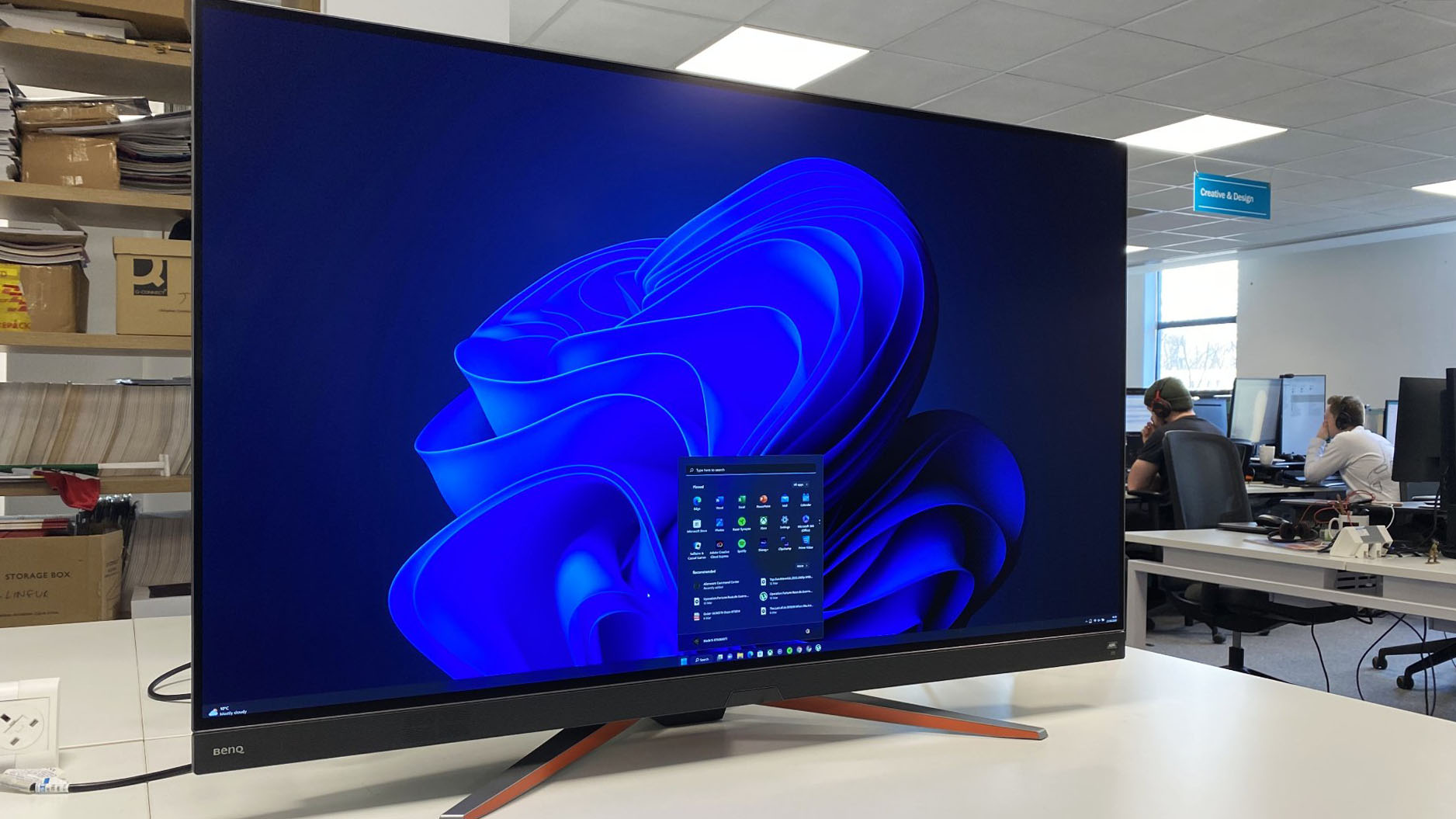
The key issue is brightness. OLED panels generally don't do full-screen brightness terribly well. For a TV, that's usually not a major issue as it's relatively rare for a TV to display something uniformly bright across the whole screen or at least a large majority of the screen.
But on the PC, that's quite normal. You might have a light-colored wallpaper or a couple of browser windows open showing mostly white webpages. In those scenarios, the brightness of the BenQ Mobiuz EX480UZ drops right back. What's most distracting is how much the brightness varies. Let's say you have Windows running in dark mode with a browser open showing a mostly dark interface, like Netflix for instance.
In that scenario, the BenQ Mobiuz EX480UZ looks great. But switch to a browser tab with a mostly white background and the brightness drops dramatically and the screen looks very dull overall.
That's the screen's ABL or automatic brightness limiter doing its thing. In mitigation, that's all much less of an issue playing games or watching movies. But even then it can catch you out. Some of the brighter outdoor scenes in a game like Cyberpunk running HDR can have the ABL kicking in pretty obviously. At this price point, that's hard to accept.
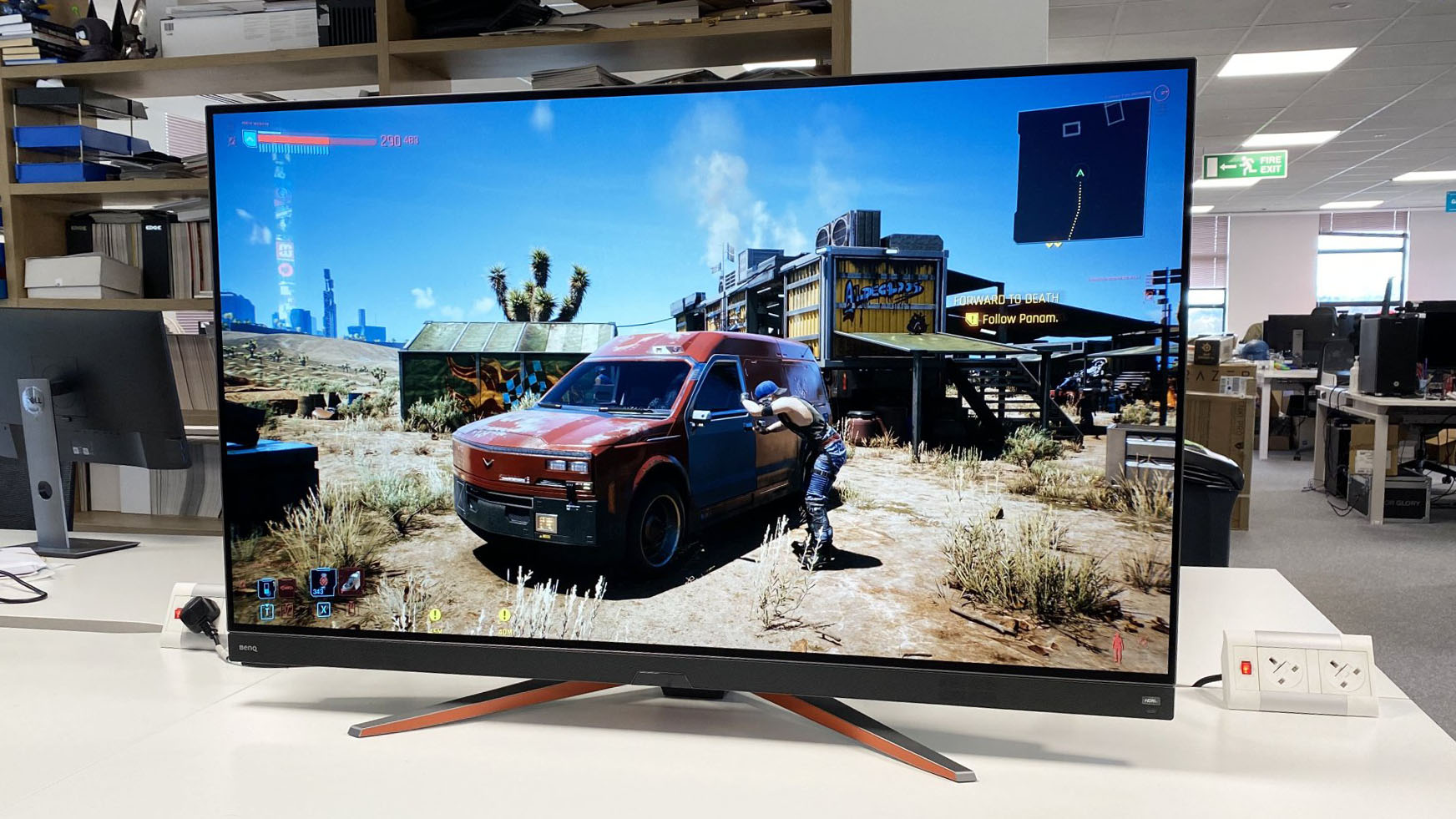
The upside, of course, involves pretty much perfect black levels and excellent contrast. The pixel response is seriously zippy, too. Add in the 120Hz refresh and the overall responsiveness is truly excellent, provided you have a seriously powerful GPU.
But fundamentally, this OLED panel lacks outright punch, something that's only more obvious in day-to-day PC usage as opposed to playing games and watching movies. Even by OLED standards, the brightness is disappointing. Monitors using Samsung's QD-OLED panel tech, including the Alienware AW3423DW are markedly better when it comes to full screen brightness.
When you factor in this screen's hefty price tag, it's very hard to justify the brightness limitations and clunky feel in day to day use - let alone recommend it as one of the best monitors right now. The excellent connectivity is nice, but if it's OLED tech for a desktop PC you're after, a 34-inch option from the best ultrawide monitors that use Samsung's QD-OLED tech is currently by far the better choice. And if you want a really big 4K screen for gaming, an OLED TV is likewise superior value.
BenQ Mobiuz EX480UZ: Price & availability
- How much does it cost? $2,049 / £1,599 (about $AU2,950)
- When is it available? Available now
- Where can you get it? Available in the US and the UK
The new BenQ Mobiuz EX480UZ is currently clocking in at $2,049 / £1,599 (about $AU2,950). We suspect the US price in particular will drop a bit fairly quickly. But even with several hundred dollars shaved off, it will still be a very expensive display.
For starters, it looks like poor value next to 48-inch OLED 4K TVs which can be had for less. So, you're paying a very large premium for the added connectivity. It also makes it hard to accept the limitations that come with the LG-sourced OLED panel BenQ is using here. It's likewise worth noting that various 34-inch ultrawide monitors based on Samsung's QD-OLED tech, like the Alienware AW3423DW, make for much better, if admittedly smaller, PC monitors and can be had for a lot less money.
- Value 2 / 5
BenQ Mobiuz EX480UZ: Specs
| Screen size: | 48-inch |
| Aspect ratio: | 16:9 |
| Resolution: | 3,840 x 2,160 |
| Brightness: | 450 nits peak |
| Response time: | 0.1ms |
| Viewing angle: | 178/178 degrees |
| Contrast ratio: | 135,000:1 |
| Color support: | 98% DCI-P3 |
| Inputs: | DP 1.4, HDMI 2.1 x2, USB-C |
| Weight: | 42.5lbs (19.3kg) |
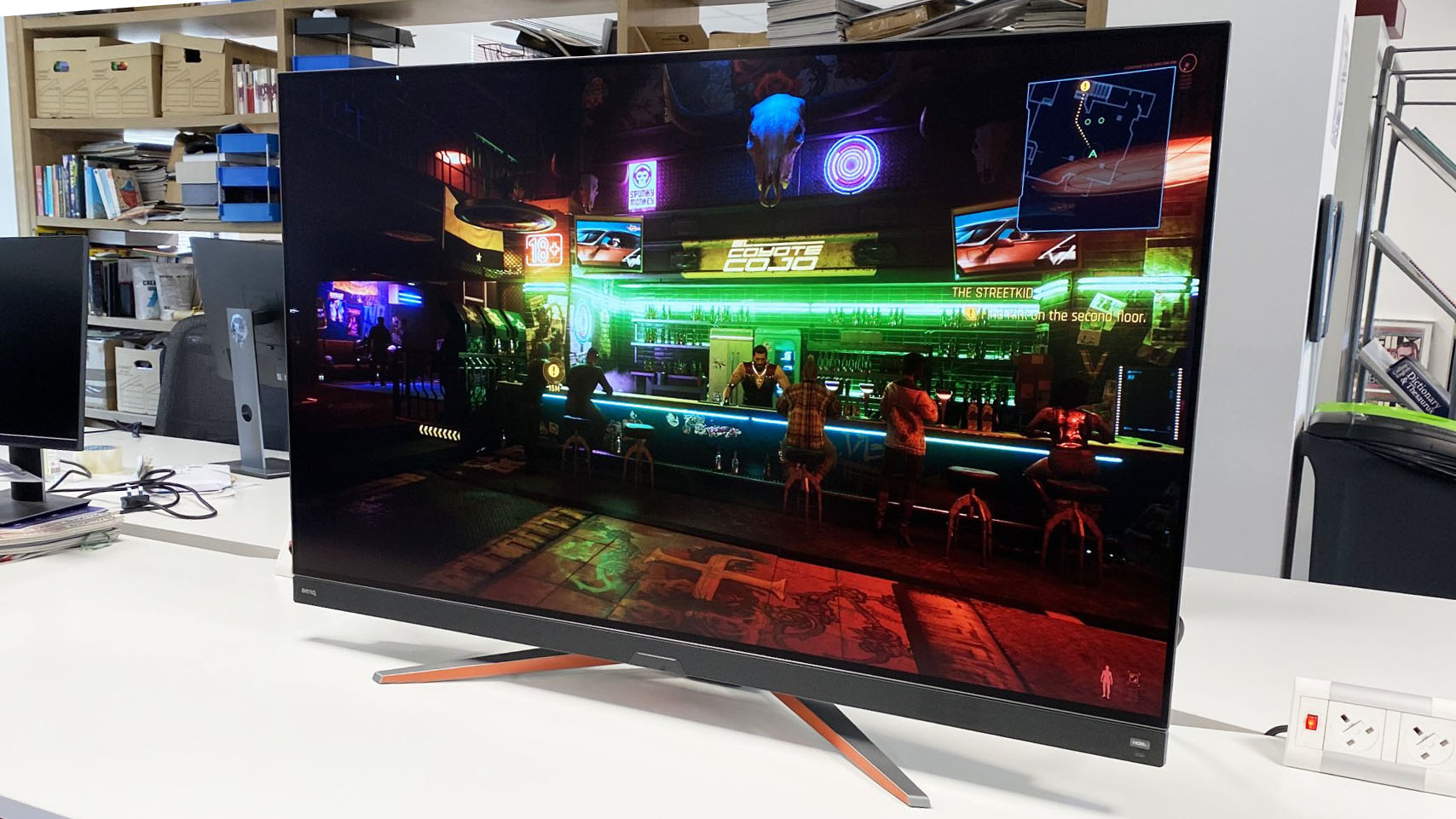
Should you buy the BenQ Mobiuz EX480UZ?
| Value | The BenQ Mobiuz EX480UZ's megabucks pricing compares poorly to similar 4K OLED TVs, never mind most PC monitors. | 2 / 5 |
| Design | A PC monitor on steroids, that's what you're getting. The proportions are huge, the design BenQ's familiar silver and orange Mobiuz shizzle. | 4 / 5 |
| Performance | It's classic LG OLED performance with fantastic contrast and response but disappointing brightness, the latter even more of an issue on the PC. | 3 / 5 |
| Average rating | Despite the excellent connectivity, this display is marginal as an actual PC monitor. It's arguably too big and definitely not bright enough. | 3 / 5 |
Buy it if...
You want that OLED experience with PC connectivity
The BenQ Mobiuz EX480UZ uses LG's familiar OLED tech in a 48-inch 4K and adds full PC features including DisplayPort and USB-C connectivity.
You appreciate really fast response
At just 0.1ms response, this huge panel is way faster than evern the very best LCD monitors, including the latest mini-LED monitors.
Don't buy it if...
You want a really punchy panel
The full screen brightness is super disappointing, something that's only more obvious when attached to a PC as opposed to being a pure TV
You want value for money
At this price point, you can choose from some of the very best PC monitors, including OLED displays based on Samsung's more suitable QD-OLED tech.
BenQ Mobiuz EX480UZ: Also consider
| BenQ Mobiuz EX480UZ | Alienware AW3423DW | Samsung Odyssey Neo G9 | |
|---|---|---|---|
| Price: | $2,049 / £1,599 (about $AU2,950) | $1,299.99 / £1,079 / A$2,098.80 | $2,499 / £1,749 / AU$2,999 |
| Screen size: | 48 inches | 34 inches | 49 inches |
| Aspect ratio: | 16:9 | 21:9 | 32:9 |
| Resolution: | 3,840 x 2,160 | 3,440 x 1,440 | 5,120 x 1,440 |
| Brightness: | 450 nits peak | 1,000 nits peak | 2,000 nits peak |
| Response time: | 0.1ms | 0.1ms | 1ms |
| Viewing angle: | 178/178 | 178/178 | 178/178 |
| Contrast ratio: | 135,000:1 | 1M:1 | 1M:1 |
| Color support: | 98% DCI-P3 | 99.3% DCI-P3 | 95% DCI-P3 |
| Inputs: | DP 1.4, HDMI 2.1 x2, USB-C | DP 1.4, HDMI 2.0 x2 | DP 1.4, HDMI 2.1 x2 |
| Weight: | 42.5lbs (19.3kg) | 22.9lbs (10.37kg) | 32lbs (14.5kg) |
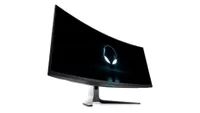
Alienware AW3423DW
Alienware's 34-inch ultrawide monitor uses Samsung QD-LED with superior full screen brightness. As a 34-inch panel, it's also arguably better suited to be an actual PC monitor than the monster 48-inch BenQ.
Samsung Odyssey Neo G9
Samsung's 49-inch ultrawide freak hits a silly 2,000 nits peak brightness while blazing along at 240Hz. It some ways it's stunning, but the full-array mini-LED backlight is a little bit buggy and the pixel density is mediocre for the money.
Read our full Samsung Odyssey Neo G9 review
How I tested the BenQ Mobiuz EX480UZ
- I tested the monitor for one week
- I tested it for web, gaming, movies, the works
- I used it on both PC and Mac, over HDMI and DisplayPort
I put the BenQ Mobiuz EX480UZ through its paces with a proper PC workout. I used it to browse the web, do a little work, stream video and most importantly game.
I ran both regular HDR content and HDR content and played games that both majored in visual thrills and also titles that are all about frame rate and response. I used test videos to assess the panel's brightness over a range of window sizes, compared the response to competing displays and snuffed out its latency levels.
I've been testing PC monitors since the early days of flat panels for many of the leading trch titles. I've seen all the major new OLED monitors, including Alienware and Philips' new 34-inch models, plus Corsair's 45-inch Flex, not to mention countless mini-LED models, so I can directly compare this new BenQ to its most important and relevant competitors.
We pride ourselves on our independence and our rigorous review-testing process, offering up long-term attention to the products we review and making sure our reviews are updated and maintained - regardless of when a device was released, if you can still buy it, it's on our radar.
First reviewed March 2023
Technology and cars. Increasingly the twain shall meet. Which is handy, because Jeremy (Twitter) is addicted to both. Long-time tech journalist, former editor of iCar magazine and incumbent car guru for T3 magazine, Jeremy reckons in-car technology is about to go thermonuclear. No, not exploding cars. That would be silly. And dangerous. But rather an explosive period of unprecedented innovation. Enjoy the ride.
